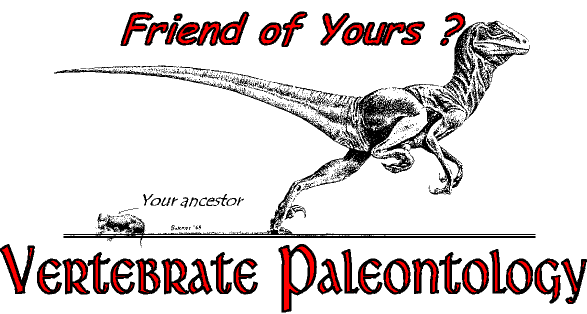
|
Lynn S. Fichter - Fichtels@jmu.edu James Madison University; 233 Miller Hall - phone 6531 |

|
|
About the Course Syllabus - pdf Text Books Part One - Evolutionary Theory Part Two - Survey of Vertebrate History Part Three - Transitions and Trends in Vertebrate Evolution |
Catalog Description
GEOL/BIO 405. Vertebrate Paleontology (3) 3 credits. Offered spring of odd numbered years.A study of the origin and evolution of the vertebrates. Emphasis will be on understanding how the processes of earth evolution and biological evolution have interacted through time to produce a coherent picture of vertebrate history. Prerequisite: GEOL 230, BIO 124 or permission of the instructor. Note: prerequisites are waved if you have some background in biology or geology. With a mixed group of biology and geology majors I have to explain geology concepts to the biologists and biology concepts to the geologists, so everything has to be developed from first principles anyway. If you need an override because the prerequisites have blocked you out of registration just ask and I will provide the override. |
|
Office Hours Monday and Wednesday 8-9; T/T 8-9; By appointment; or anytime I am in my office, which is most of the time, and not immediately tied up with something else. Just come by, or call to see if I am available. Spring 2005 Final Exam Time Monday, May 2 from 10:30 - 12:30 
|
What is Vertebrate Paleontology About? Vertebrates are only one of about 3 dozen phyla of multicelled animals, and - except for the fact we are ourselves vertebrates - it seems strange to spend an entire semester on just one phylum. And, it could be argued that we are not even the most important phylum on the planet, at least as far as understanding the biogeochemical cycles by which this planet really operates (which is mostly about bacteria and protists anyway). Nonetheless, vertebrates are large and obvious creatures we easily see around us all the time and there has always been a special focus on them. Even in the study of paleontology there has always been a tradition of a course on invertebrate paleontology (that includes everything that is not a vertebrate, so bacteria and protists also), plus one on paleobotany, and finally one on vertebrate paleontology. click here to read more |